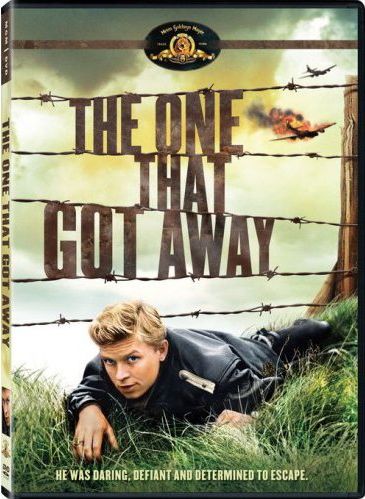Right up there with John Wayne's The Alamo, The Great Escape is my favorite movie (either A or 1-A). I love Stalag 17, Bridge on the River Kwai, Von Ryan's Express, and I can name a handful of other prisoner of war (P.O.W.) movies that I've stumbled across and really enjoyed. WWII prisoners of war has always been an interest of mine, but for the most part the only stories I've seen are from the perspective of Allied prisoners captured by the Germans, Japanese, or Italian.
One of the exceptions is 1957's The One That Got Away, the true story of a German flier shot down over England in 1939 and his efforts that followed to escape from British and Canadian POW camps. A major issue I had with the story is that it was going to be hard to root for this character to succeed. Was it going to paint the Allies as bumbling idiots who couldn't contain this one individual? He's a German prisoner, am I sure I want his character to get back to Germany? That ended up being a minor issue compared to one plot element used seconds into the movie. It gives away the ending before we've even met anyone or the credits rolled. Kind of a momentum killer if you ask me.
It's early in the war in 1939 when German fighter pilot Franz von Werra (Hardy Kruger) is shot down over England and quickly captured by the locals. So early in the fighting, both sides are still figuring out the best way to handle captured soldiers, and Werra intends to take advantage of the situation. Working against him is the fact that he's known as a hero back home in Germany for his actions during combat, and his captors have no intention of letting him do as he plans. But no matter where they send him, dogged Werra keeps working to escape whether it be in Britain where all he needs to do is get across the English Channel or even into Canada where an ocean will separate him from home and freedom.
A title card opening the movie explains that Franz von Werra was the only German prisoner of war to escape from a Canadian prison camp and return to Germany successfully. Well, that takes the mystery away a little bit, doesn't it? It is a movie based on a true story, but it is not a widely known and accepted story. How many viewers going into this movie would have known that little tidbit of history? Director Roy Ward Baker makes a huge mistake in telling us that information, or at least in my mind he did. Part of the entertainment value from these movies is not knowing who will successfully escape in the end. Who is going to make it? Who will get caught and how? That's not an issue here. Franz von Werra is going to escape. It's only a matter of how.
What I love about The Great Escape is following the efforts of these prisoners as they desperately attempt escapes. It's exciting, full of tension, and with Elmer Bernstein's score playing over the action, it's some of the best and most suspenseful action sequences I've ever come across. All that energy, all that tension is missing here for vast stretches of story. Werra's first escape attempt is an endless stream of him running shots followed by shots of his pursuers chasing him across the same fields. A second escape as he attempts to steal a British fighter and fly it to Germany is a high point of the movie, but it gets lost in a sea of slow-moving escapes. The finale is painfully slow, and still comes across as rushed when all is said and done.
SPOILERS well, sort of SPOILERS So yes, von Werra escapes by making it to a then-neutral United States. The movie closes with him being rescued after crossing a frozen over St. Laurence River only to have a title card explain what happened next. The German pilot meets with some roadblocks only to escape into Mexico, Central America and South America before returning to Germany...only to go missing a year later in a flight in the north Atlantic. For a movie that already clocks in at 110 minutes (and is sluggish at that length), it's an odd ending. My first thought was that a whole movie about the closing explanation would have been miles ahead of the rest of the movie in terms of excitement levels. Instead, the story is a series of vignettes that don't add up to much overall.
With his name the only one above the title, Kruger is the going away star here. The British cast is not impressive with roles that are necessary for the sake of the story but not particularly interesting (sorry Colin Gordon and Michael Goodliffe, among others). The problem with the von Werra character is that regardless of his cultural/ethnicity background, German, British, American, he isn't likable. He's too cocky, too sure of himself. Kruger excelled in these roles and does a fine job here, but at no point was I rooting for him to pull off a successful escape. It's an average movie based on facts that could have been interesting but never gels quite like it should. Give it a try if curious at Youtube, starting with Part 1 of 10.
The One That Got Away (1957): **/****


No comments:
Post a Comment